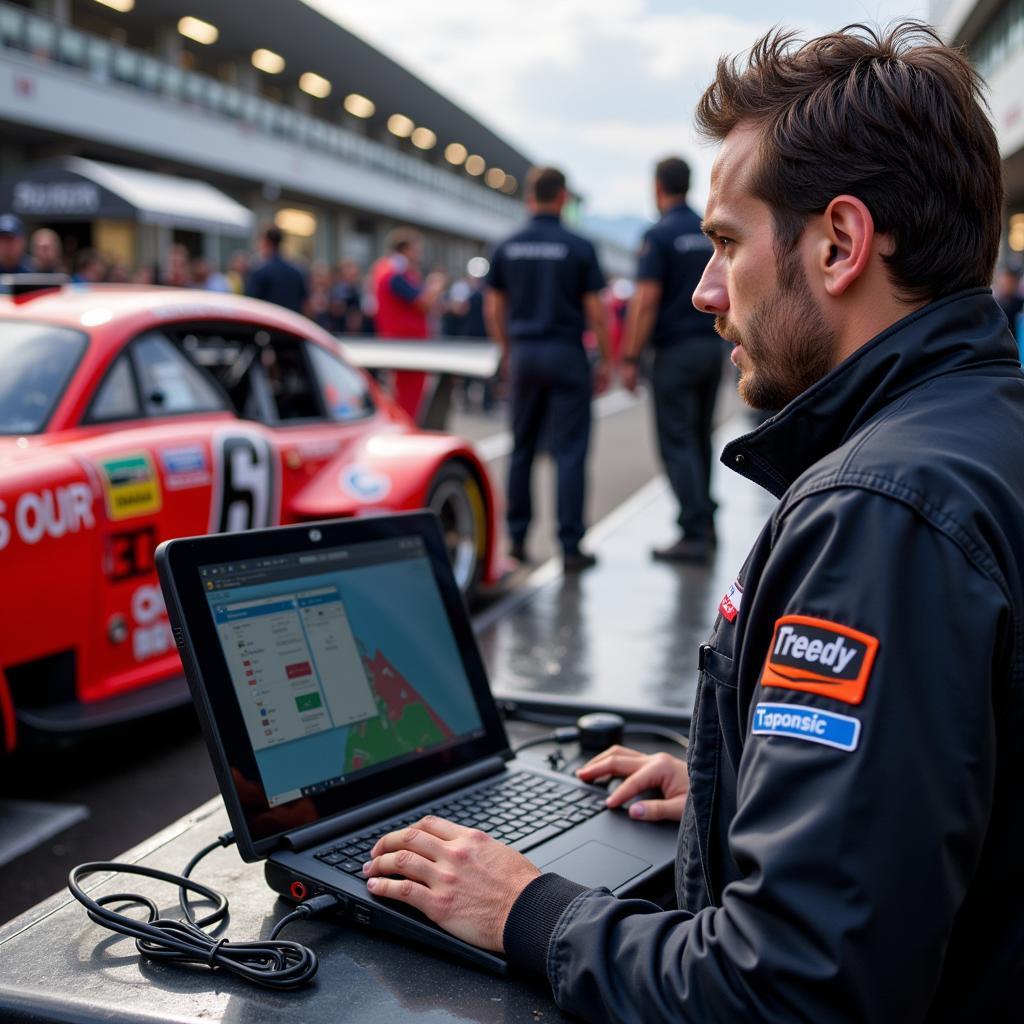The roar of the engine, the blur of the track, the quest for that extra millisecond—race car driving is a symphony of precision engineering and human skill. But behind every successful lap lies a critical, often overlooked, factor: race car diagnostics. It’s the intricate art of using technology to understand, optimize, and ultimately unleash a race car’s full potential.
The Science Behind Speed: Why Race Car Diagnostics Matter
Unlike their street-legal counterparts, race cars are pushed to the absolute limit, demanding an unprecedented level of performance and reliability. Every component, from the engine to the suspension, operates under extreme stress, making diagnostics not just helpful, but essential. It’s about more than just identifying problems; it’s about gaining a competitive edge.
Here’s how race car diagnostics translate to track success:
- Precision Tuning: Diagnostics provide real-time data on engine parameters, fuel consumption, tire pressure, and more, allowing mechanics to fine-tune the car for optimal performance under specific track conditions.
- Early Problem Detection: By analyzing data from sensors throughout the car, diagnostics can detect potential issues before they escalate into catastrophic failures, saving valuable time and resources.
- Driver Feedback: Diagnostics systems can provide drivers with critical feedback on their driving style, helping them optimize braking points, cornering speeds, and overall lap times.
 Race Car Diagnostic Equipment in Use
Race Car Diagnostic Equipment in Use
From Sensors to Strategies: The Components of Race Car Diagnostics
Modern race cars are equipped with a sophisticated network of sensors that act as the eyes and ears of the diagnostic system. These sensors collect a vast amount of data, which is then analyzed to provide a comprehensive picture of the car’s health and performance.
Key components of a race car diagnostic system include:
-
Engine Control Unit (ECU): The brain of the car, responsible for managing engine parameters, fuel injection, ignition timing, and more. Diagnostic software interacts with the ECU to extract and analyze performance data.
-
Sensors: Strategically placed throughout the car, sensors monitor a wide range of parameters, including:
- Engine: RPM, temperature, oil pressure, fuel mixture
- Transmission: Gear engagement, clutch position, fluid temperature
- Brakes: Temperature, pressure, fluid levels
- Suspension: Ride height, shock absorber travel, wheel speed
- Aerodynamics: Downforce, drag, air pressure
-
Data Acquisition System (DAQ): The DAQ acts as a central hub, collecting data from all the sensors and transmitting it to a computer for analysis.
-
Diagnostic Software: Powerful software programs process the raw data from the DAQ, presenting it in an easy-to-understand format. These programs allow engineers and mechanics to identify trends, spot anomalies, and make data-driven decisions.
Beyond the Track: The Future of Race Car Diagnostics
The world of race car diagnostics is in constant evolution, with new technologies and innovations emerging rapidly. Here are some trends shaping the future:
-
Predictive Analytics: Advanced algorithms are being developed to analyze historical data and predict potential component failures, allowing for proactive maintenance and reduced downtime.
-
Wireless Data Transfer: The move towards wireless data transfer systems eliminates the need for cumbersome wiring harnesses, making diagnostics faster and more efficient.
-
Cloud-Based Analysis: Cloud computing is opening up new possibilities for data storage, analysis, and sharing, allowing teams to access real-time insights from anywhere in the world.
Frequently Asked Questions About Race Car Diagnostics
Q: How much does a race car diagnostic system cost?
A: The cost of a race car diagnostic system can vary greatly depending on the complexity and features included. Basic systems may start around a few thousand dollars, while high-end systems used by professional racing teams can cost tens of thousands of dollars.
Q: Can I use race car diagnostics on a street car?
A: While some diagnostic tools and techniques used in racing can be applied to street cars, the level of sophistication and data granularity may not be necessary for everyday driving. However, some enthusiasts and performance car owners do utilize race-inspired diagnostics for tuning and monitoring their vehicles.
Q: What are some common problems that race car diagnostics can detect?
A: Race car diagnostics can detect a wide range of problems, including engine misfires, transmission slipping, brake imbalances, suspension issues, and aerodynamic inefficiencies. Early detection of these issues can prevent costly repairs and improve overall performance.
Need Help with Your Car Diagnostics?
Contact DiagFixPro today! Our team of expert technicians is available 24/7 to answer your questions and provide top-notch diagnostic services. You can reach us through WhatsApp at +1(641)206-8880 or email us at [email protected].
We offer a wide range of car diagnostic services, including:
-
OBD2 Bluetooth Diagnostic Car Scanner: Connect your smartphone or tablet to your car’s computer system for quick and easy diagnostics.
-
Car Mechanics Understanding Vehicle Diagnostics: Learn how our skilled mechanics use the latest diagnostic tools to identify and resolve car problems efficiently.
-
Volvo Electric Car Diagnostic: Specialized diagnostic services for your Volvo electric vehicle, ensuring optimal performance and battery health.
-
Car Diagnostics Bracebridge: Convenient and reliable car diagnostic services for residents of Bracebridge and the surrounding areas.
Whether you’re a seasoned racer or a car enthusiast, DiagFixPro is your trusted partner for all your car diagnostic needs.